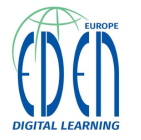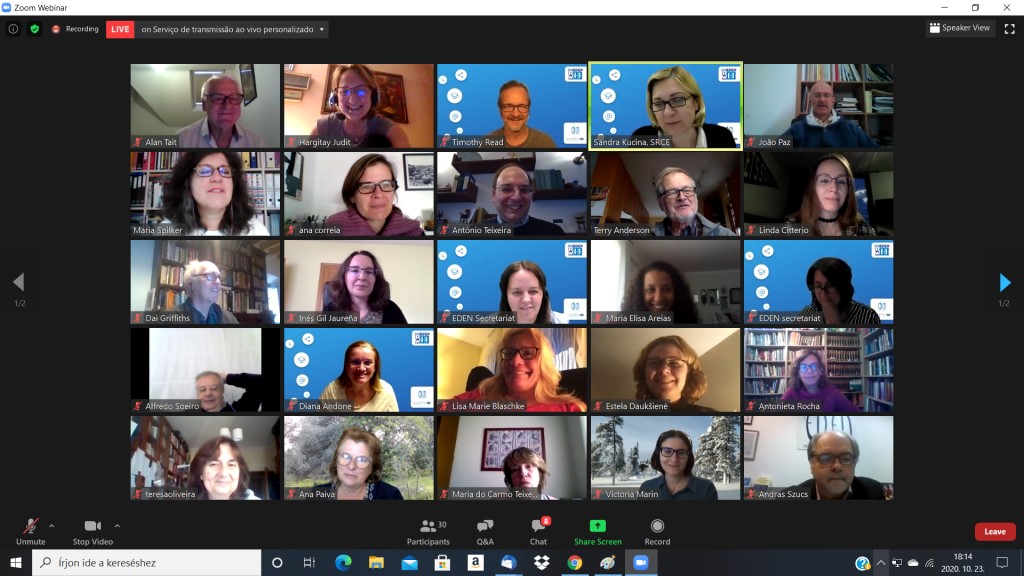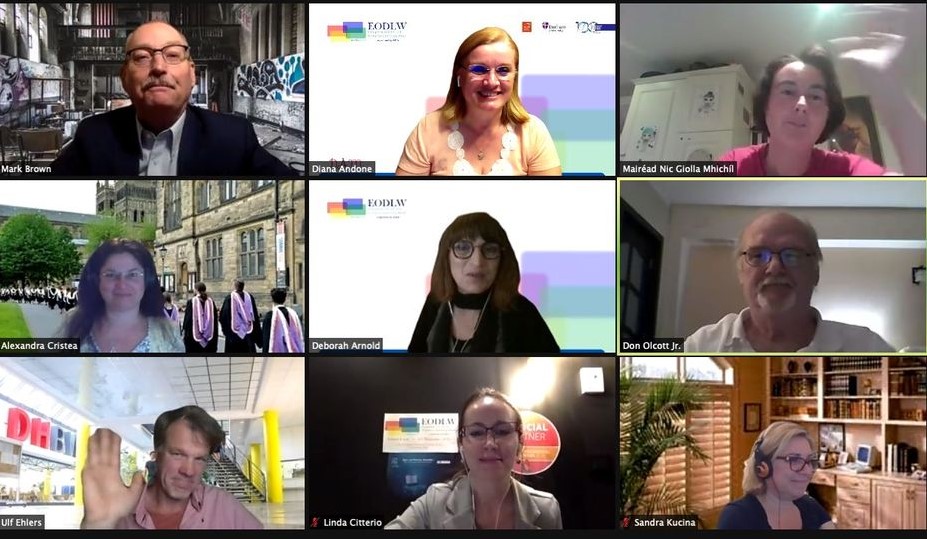We are all looking forward to the Christmas season, the best time of the year when we gather with family and friends in a festive atmosphere. However, it seems it will not be as joyful as usual, as many countries experience lockdown or restrictions again, as the pandemic is not decreasing. However, let us hope that the New Year will be better, that the vaccine will be effective, and that the lessons learned so far will help us to reset teaching and learning for a new era – the digital age.
This year was challenging for each of us in many ways. Overnight closure of schools, moving fully online, new technologies, navigating the virtual environment, organising lectures, and negotiating stressful times and even more stressful exams. In addition, we experienced that many students were unable to continue with their learning, as they did not have the technical requirements (Internet, notebooks…) available for them. Technology can ensure wider accessibility, but at the same time, it can be an obstacle. The pandemic caused crisis on a global level and created the biggest disruption of education in history. The consequences of this forced interruption of the teaching process have been far-reaching, and this measure has directly affected 60% of the world population, specifically the population covered by the educational process. After the first shock of closed schools and universities, it was time to move forward, find new and different ways to teach and learn and to ensure the continuity of education. It is often said, heroes emerge in the hardest of situations, and most definitely, educators and those engaged in education were those heroes in their significant effort to organise education. At that moment when we had to move from order and the known to chaos and the unknown, many of us felt alone, lost and uncertain what to do, unsure about how to organise teaching and learning, and even where to start. The possibility to connect and socialise, even if only online, with colleagues and with the community and professional learning networks such as EDEN proved to be of a tremendous value.
Let me take a moment here to reflect on EDEN – how we managed and how we contributed to this extraordinary situation. I am happy with the way our members, EDEN Fellows, members of the Executive Committee and friends overwhelmingly and promptly reacted and offered their expertise and support to educators and education within the EDEN initiative Education in time of pandemic #onlinetogether. In the first session, our dear friend and world known expert in the field of e-learning, Tony Bates talked about how to teach online, and 700 participants joined eagerly to receive practical advice, some reassuring words, and to gain comfort in knowing that they were not alone. In the ten sessions that followed, further globally acclaimed experts and practitioners in online and distance education joined in sharing their expertise and practical information, interacting with participants and offering practical guidance and best practice examples. Based on the very positive participant feedback and high attendance of the sessions, we decided to continue with the initiative in the autumn, this time titled Education in a time of a new normal. In these additional six sessions, we discussed, among others, the issue of digital transformation of universities – and in the last session organised the presentation of the New Digital Education Action Plan, which outlines the European Commission’s vision for high-quality, inclusive and accessible digital education in Europe.
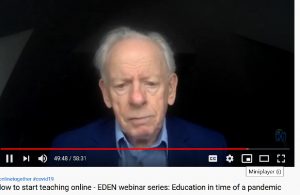 |
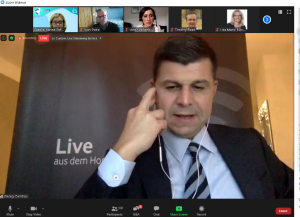 |
| Education in time pf pandemic, T. Bates |
Education in time of new normal, G. Dimitrov |
All together, we held 17 webinars with 61 speakers and moderators, over 4.300 participants worldwide and so far over 13,400 views of the webinar recordings. These numbers show the importance of providing support and a space for networking. In parallel, EDEN NAP webinars were held as part of the Network of Academic and Practitioners (NAP) activities. This year we also elected a new NAP Steering Committee, consisting of young and energetic colleagues determined to enhance the network communication of academics and professionals as a central priority. I have unwavering faith in them and the way ahead.
Although the pandemic kept us from meeting face to face, the COVID-19 situation gave us an opportunity to make broad, new strides in EDEN. For example, going virtual with our annual conference was a completely new experience and a very good one. We took full advantage of the virtual environment, hosted by the Politehnica University in Timisoara to present, to share, to discuss and to socialise. It was indeed a great gathering of the EDEN family and friends.
In the summer the pandemic seemed to decrease a bit and the situation began to look better, and we all hoped things would soon be going back to “normal”. As a result, some educational institutions chose not to take any further steps into online teaching and learning, while other institutions took full advantage of the situation and invested into teacher training, infrastructure and curricula design, engaging intensely with the digital transformation. In autumn, it became obvious that f2f teaching and learning would not be possible, and many institutions were forced to return to emergency remote teaching or some form of blended mode of learning. But issues of quality, interaction with and among students and student satisfaction were still left to be discussed. In such situations, teachers and students need support, not only technical but also advisory, to help them maintain their mental health.
The second big EDEN event this year was the Research Workshop, usually held in October. This year the host of the workshop was Universidade Aberta in Portugal. We were all eager to travel to Lisbon, to finally meet in person, and to compensate for not being able to meet in Timisoara for the Annual Conference. This workshop was a special one for many reasons: it has been 20 years since the first EDEN Research Workshop was launched in Prague! Also the title of the 11th EDEN research Workshop – Enhancing the Human Experience of Learning with Technology: New Challenges for Research in Digital, Open, Distance & Networked Education – reflected on the present situation and brought together research results on current and ongoing educational issues in this time of the pandemic. With over 200 delegates from 43 countries, this workshop has been “a triumph of resilience for the EDEN community.” (Alan Tait). In these times, research is of utmost importance, and EDEN continues to have a strong impact on increasing the significance and visibility of research, via the EDEN Research Workshop as well as the PhD Symposium initiatives.
11th EDEN Research Workshop
I would say that the crowning accomplishment of our joint efforts and networking was the EDEN Online and Distance Learning Week in November. In six days, we held a total of 13 sessions, with 62 moderators and speakers – and attracting over 2400 participants across the globe. It was a community effort, recognised through the collaboration of four professional bodies working globally – EDEN, USDLA, ODLAA and FLANZ. In addition, we had contributions from ICDE, EADTU, the European Student Union, and the Commonwealth of Learning, while also embracing the Open Classroom Conference and the European Vocational Skills Week.
The Great EODL Week Debate during EDEN Online and DIstance Learning Week
It was a week of strength and vision for the EDEN community and e-learning. The motto of the event – we are all in this together – joined our efforts and minds, reinforcing our ability to make change happen together. Let us be aware that after this experience caused by the pandemic, the way of teaching and learning cannot be the same any more. We will not be able to ignore the digital technologies, new experiences, and new skills and competencies we have gathered. We need to take this opportunity to make teaching and learning better and of even higher quality. It is a time for us to reflect on how we have managed so far, on lessons learned, and to consider ways we can do better. We have to rethink the future of teaching and learning now and not be satisfied with present solutions. The pandemic has presented us with an opportunity to fundamentally change old and outdated teaching practices and culture and open the space to radically rethink the role of university professors, the importance of course design and how todays’ students learn. We need to ask ourselves what we want our students to learn and can we provide the best possible learning scenarios for them.
EDEN has further established its place as a leading organisation in the field of open, online and flexible learning, able to offer its expertise and support in helping institutions make the transition to online and/or blended learning, connecting professionals across Europe, and supporting research in the field of online and distance learning. Our work continues in further positioning for EDEN of the future, and we have also been working on EDEN strategic planning for the next decade. The EDEN Fellows Council has engaged in the collaborative design of a vision for EDEN in 2030, and you can read about the latest developments in the EDEN Fellows blog post by Deborah Arnold. Your reflections and thoughts on our future direction and opportunities are very welcome!
With the song Have Yourself a Merry Little Christmas, I wish you all a Merry Christmas and an abundance of health, prosperity and joy in the New Year. Please continue respect the epidemiological precautionary measures and stay safe. I hope that in 2021 we will be able to meet personally at the EDEN Annual Conference, hosted by UNED in Madrid, and to celebrate the 30th anniversary of EDEN together!
